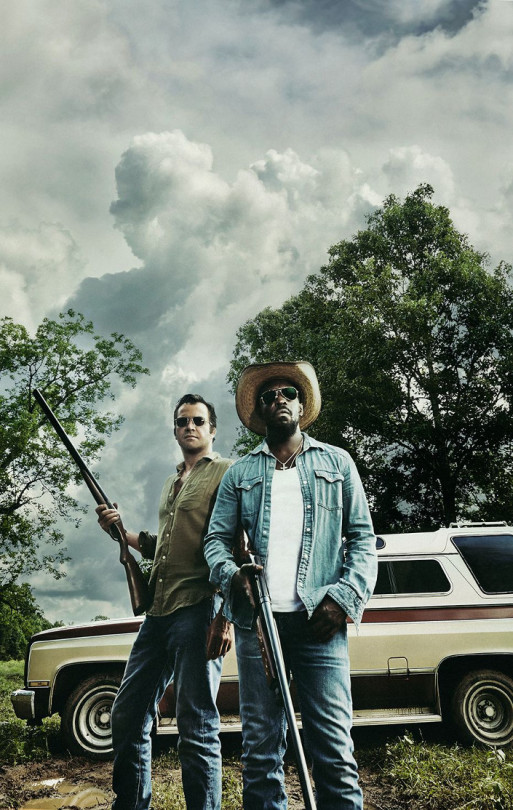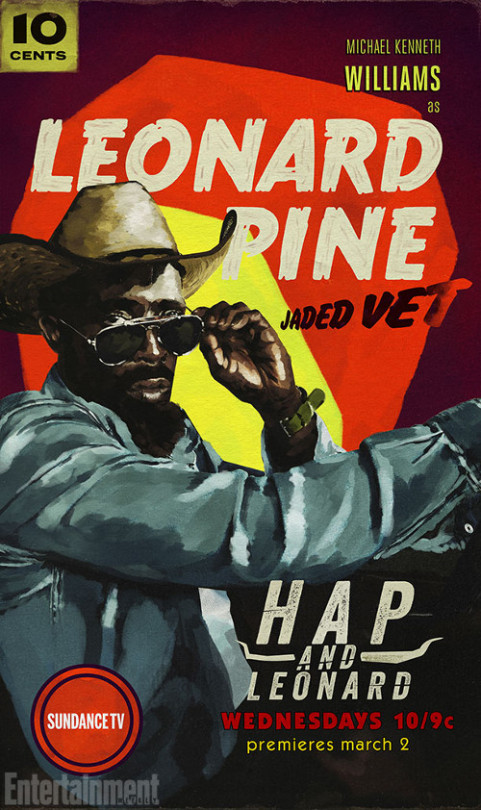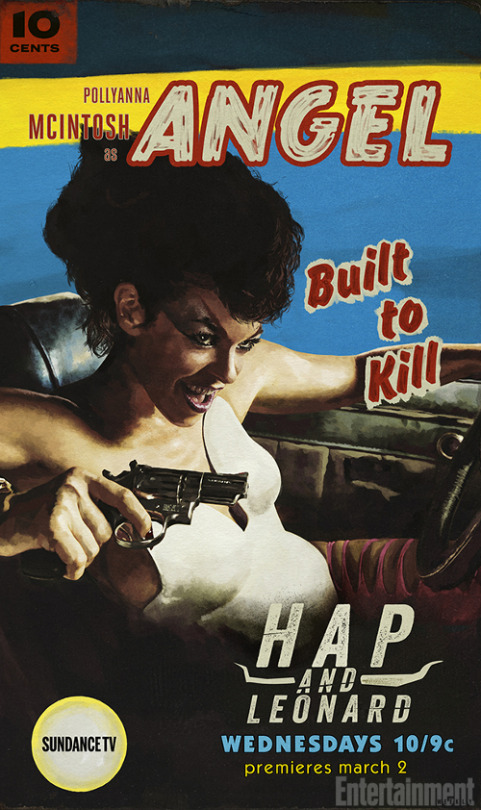HAP AND LEONARD is a must-watch
As the series nears its third episode, the articles about SUNDANCETV’s adaptation of Joe R. Lansdale’s HAP AND LEONARD series keep popping up including a discussion of the N-word, a pair of features for each Michael K. Williams and Pollyanna McIntosh

James Purefoy and Michael K. Williams as the titular characters
SALON discusses the use of the N-word on TV and how it exposes the long roots of racism.
But the preponderance of uncensored cable television has ushered in a new era of televisual profanity, and though shows like “Oz” and “The Wire” have gone whole-hog with every kind of insult, slur and derogatory phrase, there is something different about the language in two new cable shows: “Hap and Leonard,” on SundanceTV, and “Underground,” on WGN. Both shows are period pieces in the South, though of very different eras. “Underground,” which debuts tonight, takes place in plantation-era Georgia, and most of the characters are enslaved. “Hap and Leonard,” which debuted last week, takes place in East Texas in the ‘80s, at the height of the Reagan administration. And in both, the black leads are pointedly subject to racist language, including copious use of the N-word.
It’s not pleasant, but it goes a ways toward exposing the long roots of racism in America. That a few assholes in the ‘80s would be fine with throwing the word around while pointing a gun at Leonard (Michael K. Williams) is perhaps not surprising. But watching the look on Leonard’s face as the scene unspools issurprising; the typically brash, shit-talking drifter is stunned into a self-preserving silence, and even his stance seems to diminish, shrinking into himself as the scene continues.
“Hap and Leonard” is a type of television show that would be, in many other iterations, not much to comment on. The show is based on the mystery novels of Joe R. Lansdale, and as so many mystery stories do, takes the procedural structure as an excuse to spend a lot of time with its characters and its setting. The six episodes of the first season have the characters trekking through swamplands, encountering gators, skeet shooting, and listening to country-western LPs. It is normal in every way, and also, Leonard is a gay black man. And this willingness to, for lack of a better descriptor, go there is what makes the show strangely addictive and memorable, just in the way a particularly compelling mystery novel is. There’s a degree of formula at work, but at the same time, an enticing wrench thrown into the works.
Speaking of Micheal K. Williams, two features focus on the excellent actor’s portrayal of Leonard.
From TRIBECA:
Less than three months into 2016, the year’s best new TV show isn’t FX’s The People vs. O.J. Simpson, nor is it HBO’s Vinyl, although the latter’s wildly ambitious Martin-Scorsese-directed pilot certainly reached for that high bar. It’s SundanceTV’s HAP AND LEONARD (new episodes air on Wednesdays at 10 p.m. EST), an accessibly lighthearted crime saga set in East Texas in the late 1980s and laced with dark humor, sporadic bursts of violence, and a homicidal maniac dressed like a WWE reject. Hap and Leonard is a thematic and tonal descendant of Justified, channeling FX’s now-defunct critical darling’s backwoods charm and shaggy-dog mettle through its two leads, James Purefoy (as Hap Collins) and Michael K. Williams (as Leonard Pine); they play a pair of lifelong buddies and professional crooks who get pulled back into law-breaking by Hap’s old lover (played by Christina Hendricks).
Two episodes in, HAP AND LEONARD is a must-watch for numerous reasons, but the most exciting one is Michael K. Williams’ superlative performance as Leonard, a complicated man who actively defies multiple stereotypes. Thanks to his Marine background, the Vietnam vet is as tough as they come, a physical bruiser and a verbal slasher who relieves stress by pummeling a boxing speed-bag and would most likely have more corpses to his name if not for Hap’s calmingly familiar presence. Unlike the straight, white Hap, Leonard constantly has targets on his back in the eyes of the local Texas yokels because he’s, A) black, and, B) gay. Even his elderly uncle demeans him by calling him a “faggot” in public and endlessly insinuating that Leonard’s friendship with Hap must be sexual, when it’s not. Folks like his uncle and the rednecks who asks questions about his blackness are why Leonard is a ticking time bomb. One wrong look could speed up the countdown.

Image Credit: SundanceTV
Funny yet stern, sensitive yet capable of whopping anyone’s ass with ease, Williams’ Leonard is the kind of part actors dream of—especially an actor who can’t seem to break through the Hollywood movie studios’ limited casting lineups. Aside from the blink-and-you-missed-it period when he was up for Quentin Tarantino’s Django Unchained, Williams hasn’t matched the acclaim he’s received in television dating back to the 2002 premiere of HBO’s The Wire, on which he played the deadly homosexual stick-up killer Omar Little
Purefoy is good, but I want to single out Williams here. Like most people who watched “The Wire,” I have a special place in my heart for the actor, who played Omar Little, the smart, much-feared guy who robbed drug dealers and lived by his own moral code. Williams was unforgettable in the role, which was singled out by Barack Obama in 2008 as his favorite character on his favorite show. The character was unique and riveting, and he was critical to making “The Wire” not just very good but great.
Williams was fine on “Boardwalk Empire” as Chalky White, but he didn’t have a lot to do and mostly got lost in the ensemble. On “Hap and Leonard,” he’s a central character and he’s so entertaining. Some have likened Leonard to Omar, particularly since both are gay. But Leonard is more fun, as he and Hap insult each other fiercely, often racially, but always with affection. Williams expertly spits out sharp sarcastic lines, stealing scenes with only the slightest of smirks on his frowny face.

Image Credit: SundanceTV
PLAYBOY interviews Pollyanna McIntosh about her role as the psychotic Angel.
How did you get into the character of Angel?
For me it was just about making her relatable. I created this whole crazy backstory of how and why she fell in love with Soldier [Jimmi Simpson], because a lot of people would say Angel is mad, bad and dangerous to know. But she’s not a sociopath or a psychopath, as far as I’m concerned. I didn’t want to play her that way because I really felt she was genuinely in love with Soldier. I created this whole history of abuse and he was her knight in shining armor. I had this really embarrassing moment when I took Jimmi into my trailer and I was like, “I just want to read you this thing about why I love you. But not you; Soldier, right?”How did you settle on her British accent?
On the second day of shooting, when I had dialogue for the first time—Angel is a woman of few words—I was told by the producers that they really loved my natural accent and could I do Angel as a Brit? I said, “If Angel sounds like this, it doesn’t make sense. I’ve had all this schooling, and this woman wouldn’t sound like that.” So I went with this kind of Cockney vibe, which went with her more punk mode.How did you come up with the look of the character?
That was definitely a team effort with our incredible makeup and hair team and our wonderful wardrobe department. We tried to make her as big as possible with the hair. I sent them a bunch of pictures of David Bowie when he was in his glam phase. She’s definitely influenced by Grace Jones and the Sex Pistols and Bowie. It was a collaboration.
FLOSS praises McIntosh’s portrayal.
McIntosh steals the show with her characterization of Lansdale’s twisted ‘Angel’, a post-disco era femme fatale. Known for her dynamic performances in films such as the The Woman, Exam, Filth, and most recently, Let Us Prey, The Blood Lands and Tales of Halloween, McIntosh does not shy away from extreme characters or making bold choices.
